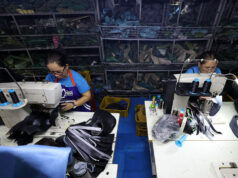BoP excess widest in 15 months
THE COUNTRY’S balance of payments (BoP) position ended at a wider surplus in April amid inflows from government loans secured to respond to the coronavirus crisis.
Bangko Sentral ng Pilipinas (BSP) data released Thursday showed the country’s BoP position stood at a surplus of $1.666 billion in April, marking its third consecutive month in surfeit. This is wider than both the April 2019 surplus of $467 million as well as the $448-million surfeit in March.
The April surplus is also the biggest since the $2.704 billion booked in January 2019.
The BoP shows the country’s economic transactions with the rest of the world within a given period.
The BSP said on Thursday it now sees the country’s BoP position hitting a surplus of $600 million this year, down from the $3 billion estimate given in November last year. The new projection is 0.2% of the country’s gross domestic product from 0.7% for the November forecast.
“The BoP surplus in April 2020 reflected mainly the inflows arising from the national government’s deposits with the BSP of its foreign loan proceeds as well as the BSP’s foreign exchange operations and income from its investments abroad,” the central bank said in a statement on Thursday.
Inflows were partially offset by foreign currency withdrawals made by the government to pay its debt obligations that month.
For the first four months, the country’s BoP position stood at a surplus of $1.598 billion, thinner than the $4.265-billion surfeit seen in the same period last year.
ING Bank N.V. Manila Senior Economist Nicholas Antonio T. Mapa said the BoP surplus may have been due to loans secured by the government for its fight against the pandemic.
“BoP remained in surplus in April even as we noted some capital flight with successive days of net foreign selling in the bond market. These outflows were likely offset by incoming dollars linked to the government’s loans from multi national institutions and foreign issuance,” Mr. Mapa said in an e-mail.
RECORD-HIGH RESERVES
At the current level, the end-April BoP position reflects final gross international reserves (GIR) of an all-time high $90.942 billion, the BSP said.
This is higher than the $88.861 billion at end-March and the $83.613 billion seen as of April 2019.
At this level, the GIR can cover eight months of imports of goods and services. It also represents about 5.5 times the country’s short-term external debt based on original maturity and four times based on residual maturity.
Data showed the BSP’s gold reserves, which form part of the country’s reserve buffer, totaled $8.015 billion for the eleventh consecutive month or since end-June 2019. This was, however, lower than the $8.123 billion seen in April last year.
Special drawing rights or the amount that the country can tap from the International Monetary Fund (IMF) stood at $1.171 billion, lower than the $1.182 billion seen at end-April 2019 but beyond the $1.167 billion as of March.
Gains from foreign investments stood at $77.886 billion, up from the $76.48 billion in the preceding month as well as the $71.847 million logged a year ago.
Meanwhile, the country’s reserve position stored with the IMF stood at $580.4 million as of April, higher than the $524.3 million at end-April 2019 as well as the $578.5 million in the previous month.
Foreign currency deposits totaled $3.288 billion, surpassing the $2.2 billion a year ago and the $2.619 billion as of March.
The BSP expects reserves to reach $91 billion by end-2020, slightly higher than the $90 billion projection it gave in November.
Security Bank Corp. Chief Economist Robert Dan J. Roces said the GIR has been one of the country’s strengths even before the pandemic and has continued to support market confidence, as seen in the peso.
“Record high GIR solidifies BSP’s ability and credibility to provide dollar liquidity and tame currency speculation especially now amidst the pandemic,” Mr. Roces said.
“The sustained build up on GIR is proof that we can continue to enjoy foreign exchange stability and GIR levels without needing to keep interest rates elevated to attract foreign inflows,” ING’s Mr. Mapa added. — L.W.T. Noble



